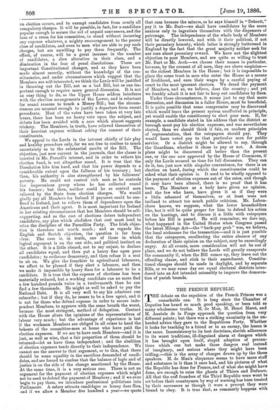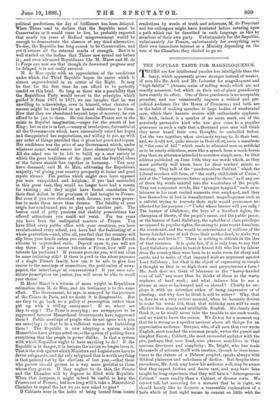THE FRENCH REPUBLIC.
THE debate on the expulsion of the French Princes was a remarkable one. It is long since the Chamber of Deputies has heard so much good speaking, or been told so many wholesome truths. M. de Man, M. Henri Maret, and M. Anatole de la Forge approach the question from very different points; but there was a striking unanimity in the un- heeded advice they gave to the Republican Party. Whether it looks for teaching to a friend or to an enemy, the lesson is the same. Inconsistency to its best doctrines, slavish adherence to its worst traditions, ill-disguised alarm at dangers which it has brought upon itself, stupid adoption of precau- tions which can but make those dangers real instead of imaginary, and serious where they might have been trifling, this is the array of charges drawn up by the three speakers. M. de Mun's eloquence seems to have more stuff and substance in it than it once had, and his pictures of what the Republic has done for France, and of what she might have done, are enough to raise the ghosts of Thiers and Dufaure. All that the real founders of the Third Republic were wont to set before their countrymen by way of warning has been treated by their successors as though it were a precept they were bound to obey. It is true that, as commonly happens with
political predictions, the day of fulfilment has been delayed. When Thiers used to declare that the Republic must be Conservative or it would cease to live, he probably expected that nearly ten years of Radical misgovernment would be enough to demonstrate the absence of any third alternative. To-day, the Republic has long ceased to be Conservative, and yet it retains all the external marks of strength. But it is well started on the incline that Thiers saw spread out before it ; and even advanced Republicans like M. Maret and M. de la. Forge can now see that though its downward progress may be delayed, it is not really arrested.
M. de Mun spoke with an appreciation of the conditions under which the Third Republic began its career which is almost unprecedented in an orator of the Right. It may be that for the first time he can afford to be perfectly candid on this head. So long as there was a possibility that the Republican Party would revert to the principles which guided it from 1871 to 1877, we can imagine that he was unwilling to acknowledge, even to himself, what chances of success might be involved in an honest adherence to them. Now that they are abandoned beyond hope of recovery, he can afford to be just to them. He can describe France not as she exists in Royalist imagination,—eager for the return of her King ; but as she is in fact,—weary of revolutions, distrustful of all the Governments which have successively raised her hopes and disappointed her expectations, and willing to put up with any order of things provided that it gives her peace and repose. Her confidence was the prize of any Government which, under whatever name, would assure her these elementary blessings. All she asked was to be left to build up a new society in which the great traditions of the past and the fruitful ideas of the future should live together in harmony. You may have dreamed,' said M. de Mun, addressing the Republican majority, of giving your country prosperity at home and good repute abroad. The parties which might once have opposed you were vanquished and helpless ; if you had succeeded in this great task, they would no longer have had a reason for existing ; and they might have found consolation for their final defeat in the greatness it had brought to France. But even if you ever cherished such dreams, you were power- less to make them more than dreams. The fatality of your origin has condemned you to play quite another part. The beaten road of petty passions and shabby persecutions has offered attractions you could not resist. For ten years you have been the undisputed masters of France. You have filled every public office with your creatures, you have revolutionised every school, you have had the fashioning of a whole generation—and, after all, you feel that the country will slip from your hands unless you condemn two or three French citizens to unprovoked exile. Depend upon it, you will not stop there. If you cannot tolerate a Prince, how will you tolerate his partisans ? If persons provoke you, will not ideas be more irritating still ? If there is peril in the silent presence of a single French family, how can it be safe to give free course to the meetings of committees, the publication of news- papers, the interchange of conversations ? If you once sub- stitute proscription for justice, you will never be able to recall your choice.'
M. Henri Maret is a witness of more weight in Republican estimation than M. de Mun, and his testimony is to the same effect. The Government, he says, is annoyed by the presence of the Comte de Paris, and no doubt it is disagreeable. But are they to go back to a policy of proscription rather than put up with a trifling annoyance ? If so, where are they to stop ? The Press is annoying ; are newspapers to be suppressed because Monarchical Governments have suppressed them ? Public meetings of people who do not agree with you are annoying ; is that to be a sufficient reason for forbidding them ? The Republic is now adopting a system which Monarchies have always acted on,—the system of putting down everything that the people in power dislike. Is that a system with which Republics ought to have anything to do ? If the Republic is in danger, it is because the nation no longer loves it. That is the risk against which Ministers and Legislatures have to devise safeguards, and the only safeguard that is worth anything is that pointed out by the elections of last year,—that those who govern should govern in a way more grateful to those whom they govern. If they neglect to do this, the Senate and the Chamber will by degrees be filled with Royalists. When that happens, it might indeed be useful to keep the Princes out of France; but how long will it take a Monarchical Chamber to repeal the law we are now asked to pass ?
If Cabinets were in the habit of being turned from insane resolutions by words of truth and soberness, M. de Freycinet and his colleagues might have hesitated before entering upon a path which can be described in such language as this by members of their own party. Unfortunately for the Republic, unfortunately for France, unfortunately for everything save their own immediate interest as a Ministry depending on the vote of the Chamber, they elected to go on.





































 Previous page
Previous page